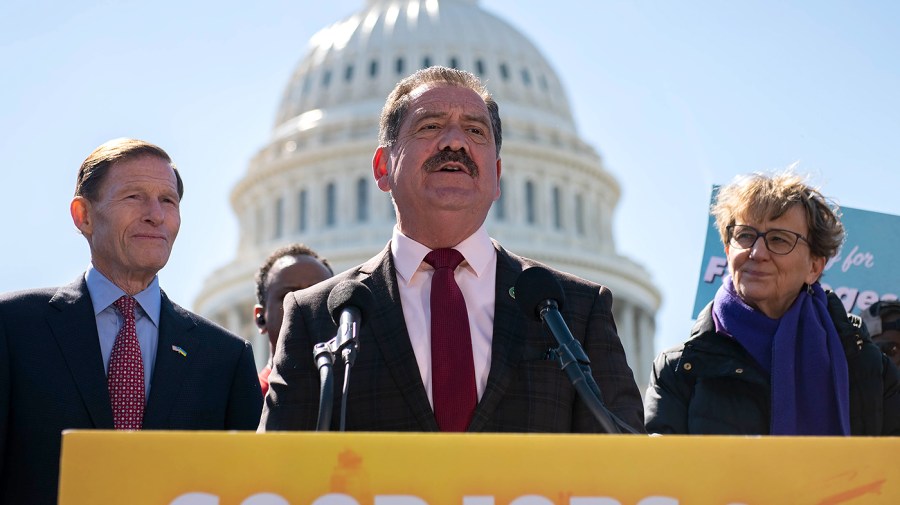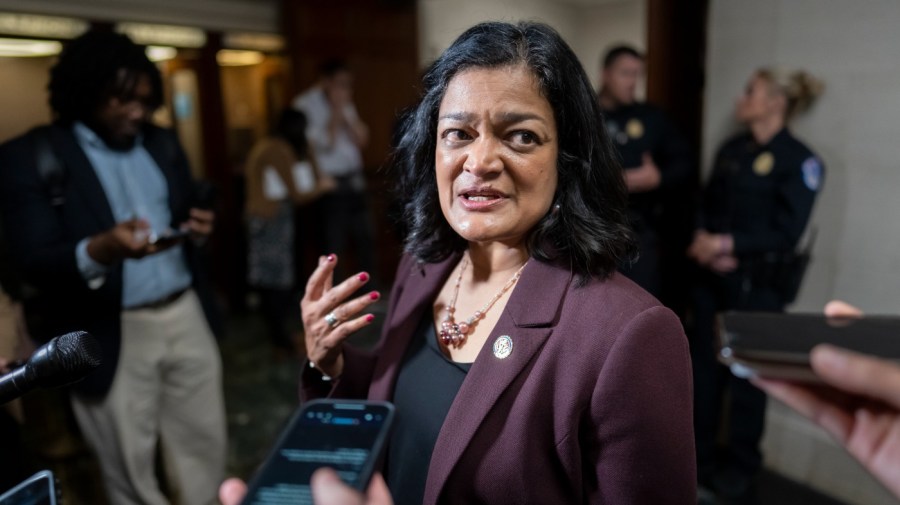House Democrats call for end to mass immigrant incarceration

Clarification: This story has been updated to reflect that Rep. Pramila Jayapal (D-Wash.) is weighing whether she will sponsor the reintroduced version of the bill.
House Democrats are re-introducing legislation Wednesday that would largely do away with the punitive immigration measures enacted in a 1996 reform.
The bill’s sponsors, Reps. Jesús García (D-Ill.), Ayanna Pressley (D-Mass.) and Greg Casar (D-Texas), see their proposal as a follow-up to the criminal justice reform push that sought to soften some of the tough-on-crime policies enacted in the 1980s and 1990s.
“Our immigration and criminal in-justice systems are deeply intertwined and have contributed to our nation’s shameful mass incarceration crisis that has separated families and harmed our communities for generations,” Pressley said.
The New Way Forward Act aims to break the connection between the criminal legal system and the immigration system with measures like ending mandatory detention for some deportable immigrants and enacting a five-year statute of limitations for deportability on some criminal convictions.
“I think that it’s very important to continue to make the case that our current system is broken, that it contributes to mass incarceration and discrimination and that it does away with due process by combining immigration law with criminal justice law,” García said.

The bill’s sponsors, including Rep. Jesús García (D-Ill.), see the proposal as a follow-up to the criminal justice reform push that aimed to soften the tougher policies of the 1980s and 1990s. (Annabelle Gordon)
Any immigration bill in the current Congress is at best a long shot to become law; the New Way Forward Act is unlikely to attract any Republican support.
“We’re always hopeful and optimistic. We recognize certain realities, including that Republicans see immigration as an important talking point where xenophobia and anti-immigrant rhetoric — they perceive to help them politically,” García said.
But the bill’s proponents seek to recreate the ideological shift that paved the way for criminal justice reform, largely based on the immigration system’s disproportionate negative effects on immigrants of color.
“What we are pointing out, is that in that bill in ’96, and in a lot of the rhetoric and subsequent immigration bills, those pieces of the ’96 reform continue to be dehumanizing of immigrants and villainizing of immigrants, and that there needs to be a counter narrative to that, and that’s what this bill seeks to do,” García said.
The proposal also seeks to bridge a generational gap for younger members of Congress, many of whom have never lived through a softening of immigration laws.
“Basically things have only gotten more right wing, more restrictive and worse on immigration my whole life,” said Casar, who was born after the immigration amnesty bill led by former President Reagan in 1986, but before the 1996 bill.
Casar, a Texas progressive who joined Congress this year, replaced Congressional Progressive Caucus Chair Rep. Pramila Jayapal (D-Wash.) as a lead sponsor on the New Way Forward bill.
Jayapal, who led the bill along with García and Pressley in the previous Congress, has not yet determined whether she will sponsor the new bill.
Casar recognized the bill’s slim legislative prospects, but drew a distinction between this proposal and other messaging bills.
“There’s messaging bills that can be conflated with virtue signaling and then [a] messaging bill which we’re actually sending a message to the American people and having a conversation with the American people that there’s members of Congress really trying to take this issue on,” Casar said.
“We need to show folks that we actually have a vision for a better country.”

Rep. Pramila Jayapal (D-Wash.), the former lead sponsor of the New Way Forward bill prior to Garcia, remains one of the bill’s sponsors. (AP Photo/J. Scott Applewhite)
That vision is at loggerheads with the 1996 reform — the last major immigration bill to pass through Congress — that was signed into law by former President Clinton.
Though the bill was spearheaded by Republicans under then-Speaker Newt Gingrich (R-Ga.), Clinton lauded the provisions that many Democrats now loathe.
“It strengthens the rule of law by cracking down on illegal immigration at the border, in the workplace, and in the criminal justice system—without punishing those living in the United States legally,” Clinton wrote in his official statement on signing the bill.
Under the 1996 bill, proponents of the New Way Forward legislation say racial disparities in the immigration system were supercharged.
“We must fundamentally reimagine these racist systems that have weaponized our immigration policies against Black and brown migrants,” Pressley said.
But the immigration system has so far evaded the reckoning that centered attention on racial disparities in criminal justice, they say.
“The crime bill has come to be reevaluated, I think, by some of the key actors there. Like President Clinton, who apologized for some of the substance in that bill,” García said.
“Others have pointed out that the bill is responsible for mass incarceration of African American and both Black and brown people in particular and poor people. And nothing like that has happened in the field of immigration.”
The Hill has reached out to Clinton’s office for comment on this story.
In 2015, Clinton spurred the criminal justice reform in a speech at an NAACP convention, where he admitted he “signed a bill that made the problem worse.”
The immigration bill’s sponsors stopped short of calling for Clinton to disavow the 1996 law but said a voice like the former president’s could move the needle.
“Ultimately that’s up to him; I don’t have him here on speed dial. But I think that would be a powerful thing,” Casar said.
“In many ways you saw how the movement for Black lives so quickly shifted the conversation on policing and mass incarceration, and I think that we need to build a similar moment on immigration reform.”
Updated 4:27 p.m.
Copyright 2023 Nexstar Media Inc. All rights reserved. This material may not be published, broadcast, rewritten, or redistributed.

